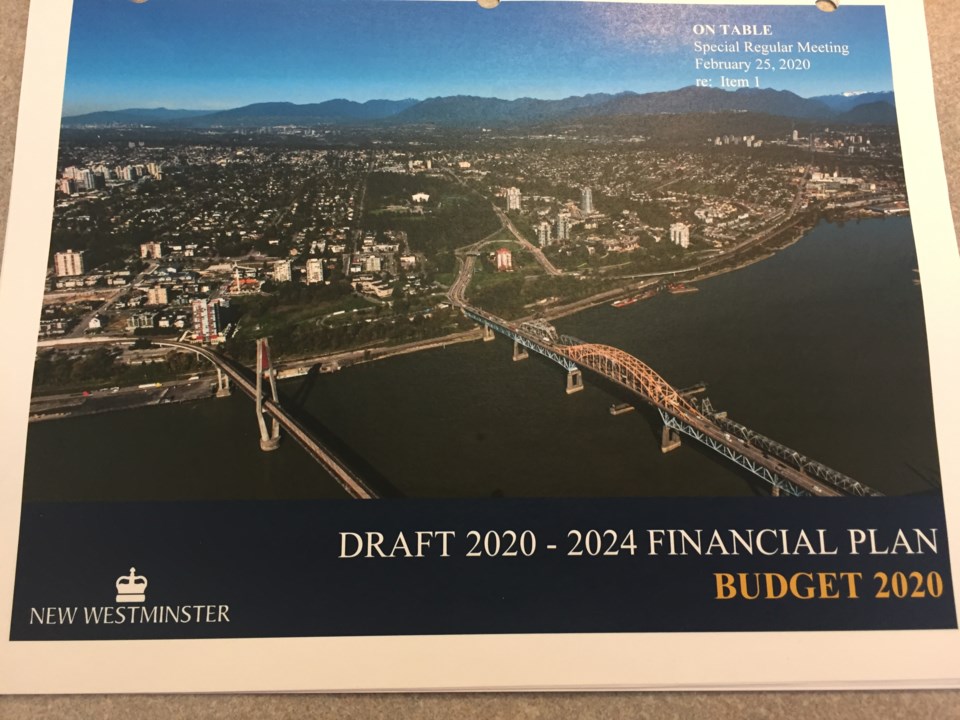The City of New Westminster’s 2020 budget includes funds to help the city meet its strategic goals and to combat climate change, but is it affordable? That is the question now being considered by council.
Staff presented the city’s preliminary draft 2020 to 2024 financial plan at a special council meeting at city hall on Tuesday night. This year’s preliminary budget proposes a 4.9% tax increase and a 1% capital levy, with a 3.9% increase being contemplated in 2021.
The city’s 2020 general fund operating expenses total about $157.7 million, which provides ongoing services such as police, fire, parks and recreation, engineering, development services, library, cultural and administration services. That’s an increase from $131.34 million in 2019, with the increase being attributed to a variety of things, including salary and benefit increases, additional staff and contracted services to deal with workload issues and strategic initiatives, as well as increased insurance premiums; cost of the Q to Q ferry operation; increased supplies for street maintenance; funding to support reconciliation; diversity and inclusion; and increased operating costs for the Anvil conference centre.
Colleen Ponzini, the city’s director of finance, said the preliminary budget includes money for a variety of enhancements as part of an “accelerated” program related to the capital program and strategic initiatives.
“This is a very front-loaded capital program. It is aggressive. I won’t say it is very aggressive and try to make it sound like it’s not doable. We believe the programs are doable,” she said. “What we are finding though is they are doable with the support of the operating requests that are included in the package.”
Nearly 90 Items are included in the “enhanced program” for the 2020 and 2021 general fund operating program, such as a manager of community arts and theatre, building security at Anvil Centre, consulting for diversity and inclusion and a corporate energy specialist.
“It’s an aggressive but exciting program,” Ponzini said. “That’s what’s driving the changes in the operating program.”
The proposed tax rate includes a variety of initiatives that support the strategic priorities and seven bold steps on climate change previously approved by council.
In terms of the capital program, the city is proposing to spend $80.1 million in 2020, with $36 million of that supporting climate action initiatives.
During Tuesday’s presentation, staff also outlined the impacts that the proposed operating program budget would have on the city’s reserves.
“When we look at our projected general fund reserves, we are in the range of $65 million at the end of 2019,” Ponzini said. “We project that to decrease to about $20 million for a couple of years – that ties of course to that accelerated front-loaded program for the capital program. Then we expect to recover, by 2024, to reach about $34 million.”
While the city has been engaged in a public engagement process regarding the five-year capital plan, Tuesday’s meeting was the first chance community members had to comment on the general fund and the proposed tax increase.
Brendan Vance, a member of the Force of Nature Alliance, said he is “inspired and hopeful” about the priorities listed in the budget, which includes an “astonishing” number related to climate change. However, he believes more needs to be done this year on the city’s plan of reallocating 10% of streets to pedestrian use, sustainable transit and public gathering spaces.
Coun. Chinu Das said staff has accomplished a “tremendous feat” by incorporating council’s seven bold steps on climate change and strategic priorities into the budget. While she supports all of the items included in the budget, she said the city needs to balance its goals against taxpayers’ ability to pay.
“Personally, I am feeling uncomfortable,” she said. “That (4.9%) and the 1% takes it to 6%.”
Coun. Patrick Johnstone said the budget reflects the significant infrastructure plan that’s proposed for the next five years, including a replacement for Canada Games Pool.
Mayor Jonathan Cote believes the city is heading in the right direction with the budget, which includes funds to address items such as affordable housing, reconciliation, infrastructure improvements and climate change.
“A lot of the pressures we do see in our budget here today are really reflective of being able to achieve this important work. These strategic priorities and these steps to tackle climate change don’t come without a cost. There are implications there. We do see a budget that does have some higher-up cost pressures,” he said. “Having said that, I do share some of the concerns of my colleagues in terms of exactly where we are landing here. We still have an opportunity to look at the budget and see how we can get this number down a bit.”
The city is required to approve the 2020 to 2024 financial plan by May 15. Staff will report back to council on the budget on March 9.
Lisa Spitale, the city’s chief administrative officer, suggested council members send questions and comments to staff, so those issues can be incorporated into the March 9 report. She said it would also be helpful for staff to know if there is a tax increase limit that council would be prepared to support.
“That is a target to work with,” she said. “That’s what we don’t have right now.”



